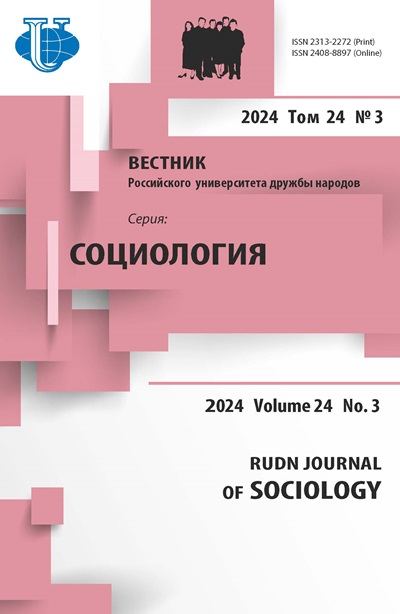Corporate professional unity under the unstable labor market in the industrial region
- Authors: Ogorodov AS1, Saranchuk SY.2, Chevtaeva NG1
-
Affiliations:
- Ural Institute of Management
- “Uralvagonzavod” Research and Production Corporation
- Issue: Vol 17, No 1 (2017)
- Pages: 83-95
- Section: Contemporary society: the urgent issues and prospects for development
- URL: https://journals.rudn.ru/sociology/article/view/15458
- DOI: https://doi.org/10.22363/2313-2272-2017-17-1-83-95
Cite item
Full Text
Abstract
The article examines the phenomenon of corporatism, which under the adverse external environment can be used by the professional community to improve the effectiveness of organization. The authors define corporatism of the professional society as a combination of homogenous interests, attitudes, traditions and values; and provide a sociological interpretation of the corporate unity through its organizational and behavioral parameters. The former consists of the perception of the organization reliability, the staff’s confidence in the future, satisfaction with the financial situation (static features), estimates of the innovative capabilities of the company, and the willingness to develop (dynamic features). The behavioral parameters include staff’s values and patterns of behavior that can contribute to the consolidation of the professional community. The authors believe that for corporate management vertical social ties are less important that the horizontal ones, such as the rule of law and honesty, and the team unity under the unstable external environment. The sample of the study conducted by the authors in 2015 consisted of various types of settlements typical for the Sverdlovsk Region: mono-towns and mono-settlements (Nizhny Tagil, Serov), towns and villages with the differentiated economic activities (Ekaterinburg, Irbit). The results of the empirical study of corporatism among different professional societies - industrial workers, social services’ and business organizations’ staff, individual entrepreneurs and authorities - revealed the internal resources that can reduce tensions on the labor market. The research data can be useful for the comparative analysis of corporatism in different regions of Russia (not only industrial and similar to the Ural Region, but differing from it by significant social and economic parameters).
About the authors
A S Ogorodov
Ural Institute of Management
Author for correspondence.
Email: esm66@yandex.ru
8 Marta St., 66, Ekaterinburg, 620144, Russia
S Yu Saranchuk
“Uralvagonzavod” Research and Production Corporation
Email: saranchuk@uvz.ru
Vostochnoye Sh., 29, Nizhniy Tagil, 622007, Russia
N G Chevtaeva
Ural Institute of Management
Email: natalya.chevtaeva@ui.ranepa.ru
8 Marta St., 66, Ekaterinburg, 620144, Russia
References
- Asatryan G.S. Talyshskij fenomen i kurdskaya mozaika – real'nost' i illyuzii [Talysh phenomenon and Kurdish mosaic – reality and illusions]. Available from: http://ru.1in.am/1140639.html. (In Russ).
- Bohen'ska I., Lanchenko I., Shahnazaryan N. Kurdskaya mekka? Gora Ararat v vospriyatii kurdov (o simvolah identichnosti) [Kurdish Mecca? Mount Ararat in the perception of the Kurds (about symbols of identity)]. Diaspory. 2010;(1). (In Russ).
- Vasil'eva E.I. Kurdskie istoriografy o kurdskih plemenah (ot Sharaf-Hana Bidlisi – XVI v. do Mirzy Ali-Akbara Kurdistani – XIX v.) [Kurdish historiography on Kurdish tribes (from Sharaf Khan Bidlisi – XVI to Mirza Ali Akbar of Kurdistani – XIX)]. Pis'mennye pamyatniki Vostoka. 2010;(2). (In Russ).
- Vertyaev K.V., Zhigalina O.I., Ivanov S.M. Politicheskie processy v kurdskih arealah stran Zapadnoj Azii (Irake, Turcii, Sirii, Irane) [Political processes in the Kurdish areas of Western Asia (Iraq, Turkey, Syria, Iran)]. Moscow; 2013. (In Russ).
- Ivanov S.M. Irakskij Kurdistan na sovremennom etape (1991-2011 gg.) [Iraqi Kurdistan at the Present Stage (1991-2011)]. Moscow; 2011. (In Russ).
- Istoriya Kurdistana [History of Kurdistan]. Moscow; 1999. (In Russ).
- Kurdskij faktor v regional'noj geopolitike [The Kurdish Factor in Regional Geopolitics] (Materialy kruglogo stola v IMEMO RAN 11.03.2015 g.). Moscow; 2015. (In Russ).
- Lazarevskie chteniya [Lasarev Readings]. Moscow; 2012;(2). (In Russ).
- Minorskij V.F. Kurdy – potomki midyan [The Kurds as descendants of Medes]. Pis'mennye pamyatniki Vostoka. 2013;(1). (In Russ).
- Primakov E.M. Konfidencial'no: Blizhnij Vostok na scene i za kulisami (vtoraya polovina XX – nachalo XXI veka) [Confidential: The Middle East on the Stage and behind the Scenes (Second Half of XX – Early XXI Century)]. Moscow; 2006. (In Russ).
- Sal'nikov A.S. Ponyatijnye harakteristiki koncepta “patriotism” v kurdskoj poezii [Conceptual characteristics of the term “patriotism” in the Kurdish poetry]. Filologicheskie nauki. Voprosy teorii i praktiki. 2009;(1). (In Russ).
- Sal'nikov A.S. “Svoi” v kurdskoj poezii [“Our” in the Kurdish poetry]. Vestnik Voronezhskogo gosudarstvennogo universiteta. Seriya “Filologiya. Zhurnalistika”. 2010;(1). (In Russ).














